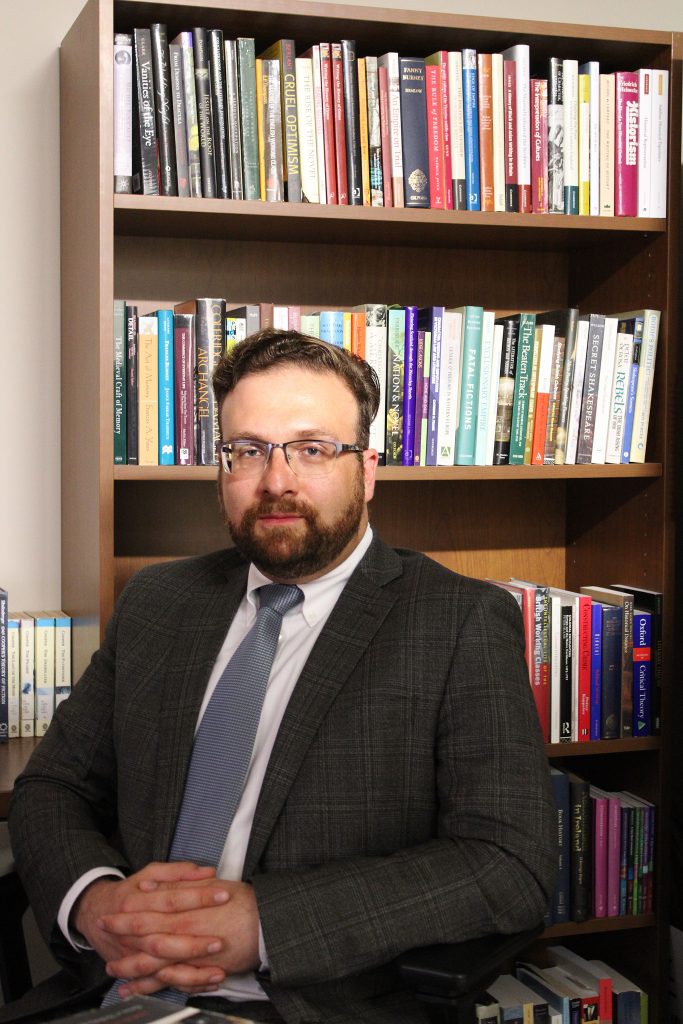CAMPUS: 18th century studies society offers fellowship to TAMIU professor
By David Gomez Jr.
Editor-in-chief
Published Monday, Sept. 26, 2022
One English professor adds another achievement to his early academic career, which only solidifies his passion for British literature.
Assistant Professor of English Adam Kozaczka recently received a fellowship award for the further expansion of 18th century studies—an award he had forgotten about while applying for others.
“It was sort of a weird moment when I found out,” Kozaczka said. “It was a moment where I had been declined from other things I had applied for and I forgot about this one, so I was like ‘Oh.’ It was a consolation prize.”

Assistant Professor of English Adam Kozaczka poses for a photo in his office on Sept. 23.
That “consolation prize” was a fellowship only offered to five U.S. research faculty members, where Texas A&M International University is represented among a group of prestigious universities.
The fellowship is awarded jointly by an organization called American Society for 18th Century Studies and Gale Research, which runs most of the databases for the University. Access to Gale’s 18th Century Collections Online, the Gale Digital Scholar Lab, and $2,500 are awarded to the researchers. The monetary prize is to jump start his research.
“The way this [competition] worked is that anyone who applied for this had to put forward a project that they were working on, or planned to be working on, and they then had to vet those projects and choose the ones they wanted to work with most,” he explained.
He completed his undergraduate at Fordham University in New York with a focus in French literature, but as a graduate student at Syracuse University, and spending time amongst British literature professors he admired, he became much more receptive to the subject matter.
“TAMIU students are receptive to Brit lit,” Kozaczka said about British literature courses he lectures.
A former student of his, TAMIU alumna Gabrielle Prather praised his methods.
“When I first took his class I was very impressed [with] how he held himself and how he spoke,” Prather said. “He is very knowledgeable in his field and he makes it so interesting to dive into.”
“He is very passionate about his work and he seems to be the type of person [who] encourages English, reading the history behind it, so passionate about social views from what I understood and how things evolved throughout historical time frames.
“Professor Kozaczka is a passionate professor,” Prather added.
Kozaczka’s research is primarily focused on the dueling trials in Britain in the 18th century.
“It’s an interesting kind of project. I haven’t worked in digital humanities for awhile,” Kozaczka said. “It’s something I did a lot as a graduate student.”
He explained in further detail how the period’s information was recorded, preserved and brought into the digital landscape. Gathered evidence from recorded trials and newspaper reports are his biggest sources.
“I am not gonna read everything in them,” Kozaczka said, “but their database has research tools that’ll model them and locate … information within them so that I could draw some conclusions about dueling trials, and the way they were recorded, in the 18th century.”
Currently, his form of fun, or hobby, comes in reading 18th century duelist trials. These trials are primarily focused in Britain. So not only does he get a kick out of reading these trials like an average kid would enjoy a comic book, but it’s also a two birds with one stone situation as it provides information for his research.
“A lot of researchers, what they do, is more hobby-like in a way,” Kozaczka said. “So if you think about the practicality of the job, it involves teaching, committee work, administrative teaching, but the stuff that most scholars enjoy, and this is true, a lot of people in this TAMIU hallway actually, are people delving into their own personal interests through the process of research.”
There is one trial that sits in his mind recently, and that would be one of patriotism, loss of property and family affairs that affected a Scotsman after returning to his native home from the loss of the American Revolutionary War.
“Something I’ve been very interested in lately is reading old trials in different time periods, and what’s interesting about this is that these trials often have the quality of something you’d expect from a novel and they’re about people’s conflicts and relationships and as you’d imagine from Court TV or that sort of thing, but thinking about it in an earlier period,” Kozaczka said.
With more than 300 pages of information from well-recorded 18th century dueling trials, it’s a diamond in the rough that could help his scholarship. Though, he wants to examine why such a barbaric act like dueling was widely seen as honorable in those days, and this is where taking advantage of his fellowship comes into play.
“Duelists were seen to be, to use an off-color term, ‘badass,’ [and] people liked them and liked reading stories about them,” Kozaczka said. “If you were on the jury in one of these and it was about a guy that shot someone else in a conflict over honor, then you wouldn’t want to put that guy in jail. You might want his autograph.”
He goes on to mention that the study of these dueling trials offers a unique look at a bygone era where these “honorable acts” were the norm—an era where the jury could be easily swayed because of the winner’s newfound celebrity status.
